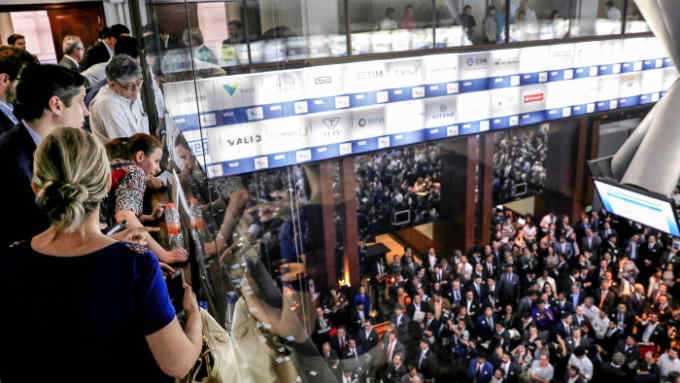Brazil’s war on graft replaces costly gifts as the new soft power


Roula Khalaf, Editor of the FT, selects her favourite stories in this weekly newsletter.
There are few better symbols of Brazil’s influence in Latin America — what it was, is and may become — than Lima’s 37m-high statue of Christ the Redeemer.
Seven years ago, Brazilian construction company Odebrecht donated $800,000 to install the Peruvian version of Rio de Janeiro’s famed statue. Hewn from white stone, and with outstretched arms, it marked a high point of Brazil’s regional influence, global ambition and colour-blind approach to international relations.
This married Brazil’s “soft power” of soccer and samba with hard infrastructure funded by cheap loans from BNDES, the development bank and financial handmaid of Brazilian foreign policy. Diplomatically, this was backed up by Unasur, the union of South American nations that sought to isolate Mexico to the north, sidestep the US and unite South America under Brazilian leadership. Books with titles such as Brazil on the Rise, Brazil as an Economic Superpower and Brazil is the new America proliferated. Brazil, traditionally so inward looking, seemed to bestride the region.
Today, the statue, officially called the “Christ of the Pacific”, is known locally as the “Christ of Theft”. Odebrecht is in disgrace for being at the centre of a web of corruption — the Lava Jato, or “Car Wash” scandal — that the US Department of Justice has called the world’s biggest bribery scheme. Unasur has all but dissolved. Brazil’s worst recession and arguably worst political crisis have cast further doubt on its leadership.
At home, the hidden cost of Brazil’s rainbow policy has also been revealed. Former president Luiz Inácio Lula da Silva is, controversially, in jail on corruption charges. BNDES is stuck with $4bn of bad loans. These include $800m owed by Venezuela and must, reportedly, be incorporated into the budget, implying that Brazilians will ultimately foot the bill.
A remarkable rise and a tragic fall. That said, it would be wrong to think that it marks a dimming of Brazilian influence — the country’s size and $2tn economy see to that. Nevertheless, Brazil’s projection of soft diplomacy may also be expanding. Many hope this remains true whoever is president next and whatever the state of the economy.
That may sound paradoxical, especially as no one knows who will lead the world’s fifth-largest country after October’s presidential vote.
It is already an election like no other. After more than 20 years of power alternating between the Brazilian Social Democracy party and the Workers’ party, it is outsiders who lead the polls. The next president could be Jair Bolsonaro, a far-right congressman who makes Donald Trump seem mild; Marina Silva, a leftist environmentalist with market-friendly policies; or somebody in-between. According to online betting markets PredictIt and Betfair, Geraldo Alckmin, former governor of São Paulo state, has a 35 per cent chance of winning.
Whoever becomes president must contend with the shifting coalitions of Brazil’s fragmented congress. At present, it contains more than two dozen parties, with the largest controlling less than 12 per cent of the seats. That said, “winning the polls might prove to be a lot easier than actually governing the country”, suggests consultancy Stratfor, and against such a backdrop it is near impossible to anticipate what Brazilian foreign policy will be.

There are some constants amid the uncertainties. One of the most important is the constitutionally guaranteed independence of Brazil’s judiciary and prosecutors. These are the men and women who have pursued corruption probes, such as Lava Jato, that have led to the conviction of multiple business leaders and politicians. The investigations have shown that Latin America is not defenceless in the face of corruption, something that Sérgio Moro, the probe’s leading judge, has also emphasised.
While not perfect, the investigations have set a benchmark for fighting corruption — the emerging world’s biggest scourge. The World Bank estimates $1tn of bribes are paid every year, while the World Economic Forum believes that the annual cost of corruption is equivalent to 5 per cent of global economic output, or $2.6tn.
No other Bric country comes close to Brazil’s response. It has been propelled by pressure from civil society and led by an independent judiciary, unlike politically motivated purges in China, Russia or Saudi Arabia. It has also shown up countries that fail to tackle corruption in similarly systematic ways. Many in the region, especially Mexico, rue that such investigations have not happened there.
The approach has also been matched by other measures, especially in politics. Corporate donations are no longer allowed in Brazilian electoral campaigns and politicians are being stripped of their legal immunity. In short, Brazil’s anti-corruption drive is likely to continue.
Such leadership by example, as Marcos Troyjo, a Brazilian academic at Columbia University, has said, is the “very essence of soft power”.
Exporting the rule of law, rather than corruption, is also timely. As Brazil steps back from financing regional infrastructure as part of its foreign policy, China — not known for its transparency — may be stepping in instead.
“A monument should be built to those valiant [Brazilian] judges!” Nobel-prize winning author Mario Vargas Llosa recently told the Financial Times.
The writer is the FT’s Latin America editor

Comments